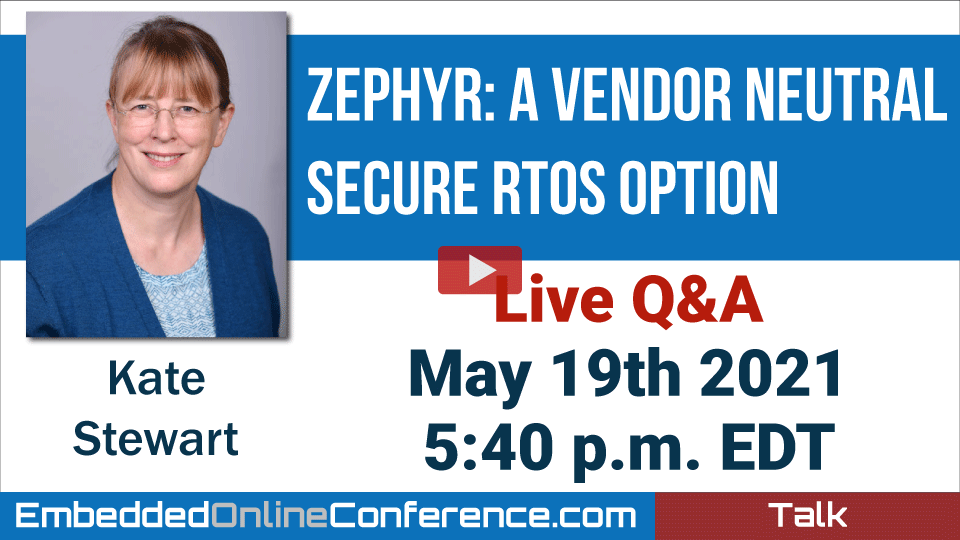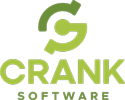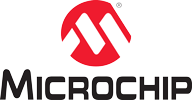Home > On-Demand Archives > Q&A Sessions >
Live Q&A - Zephyr: A Vendor Neutral Secure RTOS Option
Kate Stewart - Watch Now - EOC 2021 - Duration: 22:45

Sorry for the delay in response.
For C++ thread support, there is the recently merged support for https://github.com/zephyrproject-rtos/zephyr/issues/21519
For different hardware platform testing - there is a testing working group, and they focus on a core set of platforms in addition to the general testing in simulation that happens on every commit. In terms of the boards (https://github.com/zephyrproject-rtos/zephyr/tree/main/boards), different levels for each I'm afraid. More details probably best found out by joining the Zephyr slack channel and asking about specifics there.
Full details on the drivers supported can be found by going through https://github.com/zephyrproject-rtos/zephyr/tree/main/drivers, and https://docs.zephyrproject.org/latest/reference/index.html#api-reference in particular https://docs.zephyrproject.org/latest/reference/peripherals/index.html might be useful.
is there any real-time performance confidence indicators and can realtime performance be known across implementations on different platforms
Would this be useful for space applications?
Assuming you mean applications that go above the earth's atmosphere? Depends on the use case and certifications required, but don't see a reason why not. Its got a tight focus on minimum resource usage, which is going to be needed.
Hi Kate. Amazing talk. I don't know all the security focus on Zephyr. Is amazing. I have a question:
Where I obtain a tutorial 101 for start with Zephyr on STM32?
We're working on a free online EdX course for providing an intro to Zephyr, which will hopefully be available before the end of the summer. We're using Renode simulator for the standard environment for the exercises though, rather than STM32.
For right now: https://docs.zephyrproject.org/latest/getting_started/index.html should be able to walk you through getting to blinky. There are over 30 STM32 boards in the repo, so hopefully one of them matches what you have handy.
Thanks Kate... I will start to work on that :) Thanks
There's a .pdf of the slides that can be downloaded on the lower left of this page, for those who would like to follow the links.
Once an API is created is it locked in or will some of the APIs change over time?
Hi Jean,
The LTS has the API's locked down during its support period. There is an API review committee that tracks and reviews any changes happening in development that impact the APIs.
Why so many commits? Adding features? Bugs being corrected? This many commits makes it difficult for safety certification no?
I think that's why they have the LTS releases every two years. That would leave enough time to put them through the safety auditing process.
Yes, there is an LTS every 2 years. Once an LTS is cut, only bug fixes which is much less frequent. The 50K commits are in Development tree. Its mostly features being added - with over 250 boards, there's a lot of driver, config, etc. information. The LTS 2 is going to be the basis for the 61508 certification, but we're preparing the code base to get it ready now.
18:41:22 From Keith J : Jean - the king of RTOS! :) 18:41:40 From Leandro Pérez : Amazing the security of the Zephyr 18:41:55 From Leandro Pérez : I don't know all the benefits of the OS 18:44:48 From Dave Nadler : Thanks for a great OS and great talk! A few questions: Does Zephyr provide C++ support, especially C++11 concurrency and threading support? Can you speak to Zephyr testing on different hardware platforms? While delivering numerous products using FreeRTOS, the bane of our development is horrific vendor-provided drivers (especially USB and Ethernet). I understand Zephyr has the protocol stacks, but what about hardware-specific drivers? 18:45:14 From Leandro Pérez : I see in the presentation that the system include the drivers... I2C, UART and so... In which architectures include this drivers? in all available? 18:47:55 From Cezar Burlacu : from what I remember on each board/soc there is a file which specify which peripherals are supported... 18:53:23 From Sam : I may have missed it, is pen test done on Zephyr? 18:54:57 From Sam : Hacking's old definntion is making something work a way no one ever thought of. 18:55:28 From Radu Pralea : I understand that Zephyr is multicore-oriented (supports SMP) by design, is this correct? If yes, can it also be deployed in an AMP mode (e.g. on heterogeneous SoCs (different cores))? 18:56:55 From Michael Kirkhart : Sorry - I talk too much! 18:57:26 From Sam : Kirkhart, you're passionate, nothing wrong with that :) 18:58:36 From Michael Kirkhart : @Sam: thanks - I just need to remember that others have questions as well :) 19:00:55 From Jacob Beningo : @Michael not a problem! I hate to interrupt! 19:01:06 From Keith J : Thank you Kate! 19:01:14 From Yuriy Kozhynov : Many thanks! 19:01:18 From Sam : thank you. 19:01:20 From dayolawa : Thank you! 19:01:24 From Raul Pando : Thanks Kate 19:01:24 From Siva Aduri : Thank you Kate 19:01:35 From Vim : Thank you Kate 19:01:41 From Christopher Long : Thank you for the great talk. I am excited to give Zephyr a try. Thank you Kate! 19:01:50 From Jean Labrosse : Thanks Kate 19:01:59 From Heath Raftery : Wonderful Q&A. Well done Kate 19:03:34 From Michael Kirkhart : I have several talks I need to finish watching, so my "day" is not over yet


























Thanks for a great OS and great talk! A few questions:
Does Zephyr provide C++ support, especially C++11 concurrency and threading support?
Can you speak to Zephyr testing on different hardware platforms?
While delivering numerous products using FreeRTOS, the bane of our development is horrific vendor-provided drivers (especially USB and Ethernet). I understand Zephyr has the protocol stacks, but what about hardware-specific drivers?